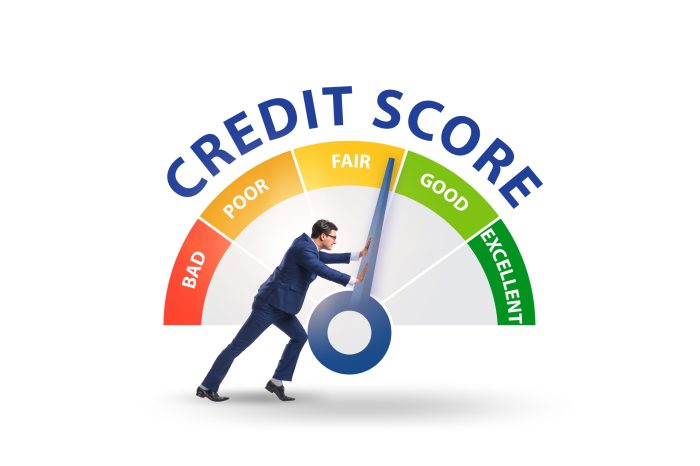Credit score improvement is crucial for a solid financial foundation. By enhancing your credit score, you can secure better loan terms, lower interest rates, and open doors to opportunities like renting an apartment or landing a job. Let’s dive into the world of credit scores and explore strategies to elevate your financial standing.
Importance of Credit Score Improvement
Improving your credit score is crucial for your financial health. A higher credit score can open doors to better loan terms and lower interest rates, saving you money in the long run. It also shows lenders that you are responsible with your finances and can be trusted to repay your debts.
Impact on Loan Terms and Interest Rates, Credit score improvement
A higher credit score can lead to better loan terms, such as lower down payments, reduced fees, and higher loan amounts. Lenders are more likely to offer you lower interest rates if you have a good credit score, ultimately saving you thousands of dollars over the life of a loan.
Impact on Renting and Employment
Your credit score can also affect your ability to rent an apartment or get a job. Landlords often check credit scores to assess your financial responsibility and ability to pay rent on time. Some employers may also consider credit scores as part of the hiring process, especially for positions that involve handling money or sensitive information.
Overall Financial Well-being
In general, a higher credit score can improve your overall financial well-being. It can help you qualify for better credit card offers, secure lower insurance premiums, and even negotiate better terms on utility services. Taking steps to improve your credit score now can have a positive impact on your financial future.
Understanding Credit Scores

Credit scores play a crucial role in determining an individual’s financial health and ability to access credit. These scores are calculated based on several factors and can vary depending on the scoring model used.
Calculation of Credit Scores
Credit scores are typically calculated using information from credit reports, such as payment history, credit utilization, length of credit history, new credit accounts, and credit mix. These factors are weighted differently depending on the scoring model.
- Payment history: This is the most significant factor, accounting for about 35% of a credit score. It reflects whether you have paid your bills on time.
- Credit utilization: This accounts for about 30% of your score and looks at the amount of credit you are using compared to your total available credit.
- Length of credit history: This considers how long you have been using credit, with longer histories generally being more favorable.
- New credit accounts: Opening multiple new accounts in a short period can negatively impact your score.
- Credit mix: Having a variety of credit types, such as credit cards and loans, can positively affect your score.
FICO Scores vs. VantageScores
FICO scores and VantageScores are the two most commonly used credit scoring models. While both use similar factors to calculate scores, they may weigh these factors differently, leading to variations in scores. FICO scores range from 300 to 850, with higher scores indicating better creditworthiness. VantageScores range from 300 to 850 as well, with similar score ranges signifying creditworthiness.
Credit Score Ranges and Significance
Excellent: 800-850 – Indicates exceptional credit and high likelihood of approval for credit at favorable terms.
Good: 670-799 – Reflects a solid credit history and good chances of approval for credit.
Fair: 580-669 – Shows some credit issues and may lead to higher interest rates or limited credit options.
Poor: 300-579 – Indicates significant credit problems and may result in difficulty obtaining credit or high interest rates.
Strategies for Improving Credit Scores: Credit Score Improvement
Improving your credit score is essential for better financial opportunities. By following specific strategies, you can boost your credit score and increase your financial health.
Pay Bills on Time
One of the most critical factors affecting your credit score is your payment history. Make sure to pay all your bills on time, including credit card payments, loans, and utilities. Late payments can significantly impact your credit score negatively.
Keep Credit Card Balances Low
Another essential strategy for improving your credit score is to keep your credit card balances low. High credit card balances relative to your credit limit can hurt your credit score. Aim to keep your credit card utilization below 30% to maintain a healthy credit score.
Check Credit Reports Regularly for Errors
Regularly checking your credit reports is crucial for identifying any errors or inaccuracies that could be dragging down your credit score. By reviewing your credit reports from all three major credit bureaus (Equifax, Experian, and TransUnion), you can ensure that all information is accurate and up to date.
Building Credit History

Building a positive credit history from scratch is crucial for establishing a strong financial foundation. By following certain strategies, individuals can start building their credit history and improving their credit scores over time.
Types of Credit Accounts
- Revolving credit accounts, such as credit cards, allow you to borrow up to a certain limit and make minimum monthly payments. This type of account can show lenders your ability to manage debt responsibly.
- Installment loans, like car loans or student loans, involve borrowing a set amount of money and repaying it in fixed monthly installments. Timely payments on installment loans can demonstrate your ability to handle long-term debt.
Authorized User Status
Being added as an authorized user on someone else’s credit card can help improve your credit history, especially if the primary cardholder has a good credit score. As an authorized user, you can benefit from their positive credit history and responsible credit card usage. However, it’s important to ensure that the primary cardholder makes on-time payments and maintains a low credit utilization ratio to maximize the impact on your credit score.




